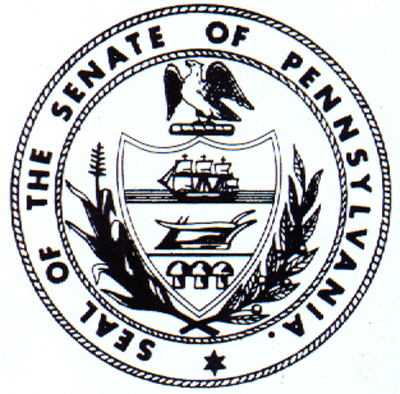STATE ACTION REAFFIRMS AUTHORITY
OVER RIPARIAN RIGHTS
HARRISBURG, February 22, 2008
– The state has enacted two pieces of legislation confirming that submerged
lands along the Delaware River belong to the taxpayers of the commonwealth. The
bills leave no doubt that the state has exclusive authority to convey permission
for the use of those riparian rights, and to impose terms and conditions upon
that use.
Acts 4 and 5 of 2008, which were signed today by
Governor Ed Rendell, grant riparian rights along the Delaware River to two
condominium developers. They began as House Bills 1621 and 1627, sponsored by
Rep. Michael O’Brien (D-Philadelphia) and were first considered by the General
Assembly in July of 2007. They include requirements for Community Benefits
Agreements between the developers and neighborhoods.
“The legislation allows development in a manner that
will be good for the community, while providing public access to the river and
green space,” O’Brien said. “The bills are the result of an open and transparent
process with community input. The state was able to establish conditions when
permitting this development.”
To address a legal controversy that arose late last
year concerning authority over riparian rights, the Senate and House of
Representatives recently added amendments to the two bills, clarifying that
submerged riverbed lands are state property whose use can be authorized only by
legislative action. They then passed the final versions by overwhelming margins
(49-0 for both bills in the Senate, and 169-26 and 162-33 in the House) and sent
them to the Governor.
“We believe the matter was clear from the beginning,
but these two pieces of legislation eliminate any confusion, once and for all.
The state has sole power to award rights to submerged riverbed land, which state
taxpayers own,” said state Senator Vince Fumo (D-Philadelphia.)
State Rep. Bill Keller added, "I have always maintained
that the Pennsylvania Legislature has the sole authority to grant riparian
rights to submerged lands along the Delaware River. Passage of this legislation
removes any and all clouds on this issue and makes it crystal clear that the
Pennsylvania Legislature is the overriding authority when it comes to granting
riparian rights."
In November 2007, the administration of Philadelphia’s
then-mayor John Street had announced that it was granting a license to use a
tract of submerged Delaware River land to the developers of the proposed
Sugarhouse casino. The City relied on an outdated 1907 law. Doing so would have
deprived commonwealth taxpayers of compensation in exchange for allowing
Sugarhouse to occupy the taxpayers’ land.
Fumo and O’Brien, whose respective Senate and House
districts include the Sugarhouse location, challenged the City’s action before
the state Supreme Court in December. A bipartisan group of five other House
members whose districts abut the Delaware River joined that appeal – Senator
Michael Stack and Representatives Keller, John Taylor, Michael McGeehan and
Robert Donatucci. HSP Gaming LP, parent of Sugarhouse, has sought dismissal of
the appeal.
New mayor Michael Nutter revoked the City-issued
riparian license for Sugarhouse shortly after taking office in January, but did
so without clarifying that riparian authority rests with the state. HBs 1621 and
1627, as amended, address the central issues in HSP’s attempt to have the appeal
dismissed, by reaffirming that only the General Authority can authorize
conveyance of public land, and that the General Assembly can impose costs, terms
and conditions that it may deem appropriate when executing such conveyances.
For example, the two bills impose a $5 per square foot
charge upon the land footprint of the development, and an additional $1 charge
per each square foot of building space. This is expected to produce $500,000 in
revenue for the Commonwealth. The 99-year leases also includes the requirement
that a community benefits agreement be executed between the developer and the
local neighborhood association within 18 months.
"There has always been a process,
and that process usually worked well when all parties followed the law rather
then trying to circumvent it. We can now all get back to encouraging and
monitoring neighborhood-friendly development along the waterfront that adds to
the overall quality of life in our city, without threatening local
neighborhoods," Keller said.
“These two statutes, and the margins by which they were
approved in both chambers of the legislature, represent a clear rebuke of the
City’s attempt to turn over state property to a private developer at bargain
basement rates,” Fumo said. “Obviously, members of the House and Senate believe
state taxpayers are entitled to appropriate levels of compensation for their
land.”
The bills extend 99-year leases for two parcels of
submerged Delaware River land to VTE Philadelphia, LP, and to NCCB Associates,
LP for the purposes of condominium development.
“The signing of these bills breaks a logjam on
waterfront development that the administration created 18 months ago when it
imposed a moratorium,” O’Brien said.
Language in both bills states as follows:
“The General Assembly hereby affirms its existing, sole
and exclusive authority to consider and specifically authorize the conveyance of
any title, easement, right of way or other interest in commonwealth-owned lands,
such as those set forth herein, pursuant to the . . . Administrative Code of
1929 and the . . . Dam Safety and Encroachment Act.”
The language goes on to note that there are limited
circumstances under which the state Department of Environmental Protection may
grant such conveyances without additional legislative authorization.
# # #


